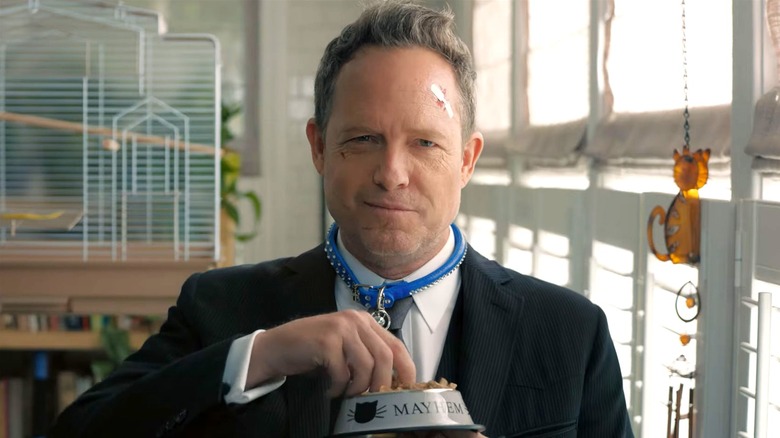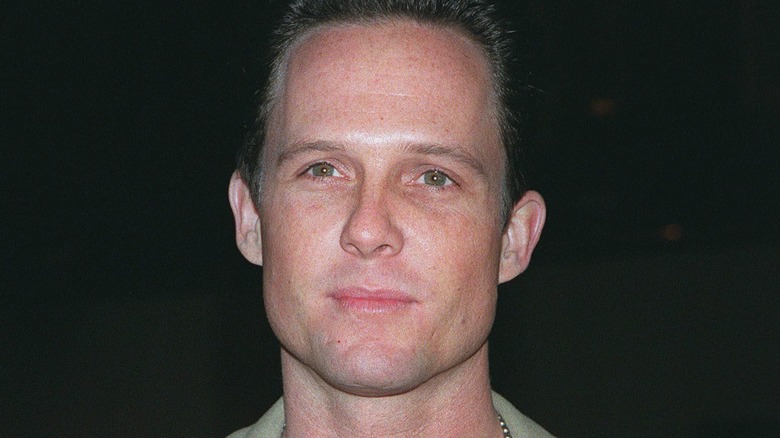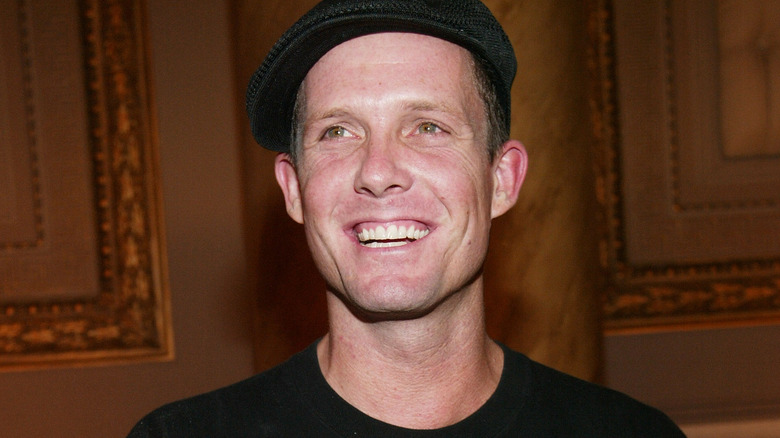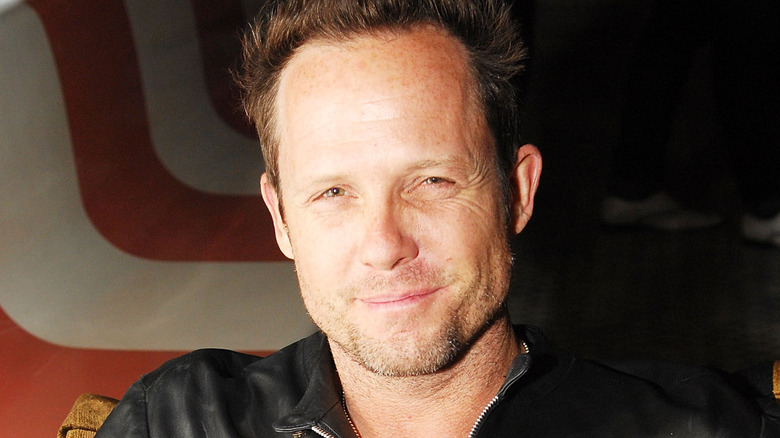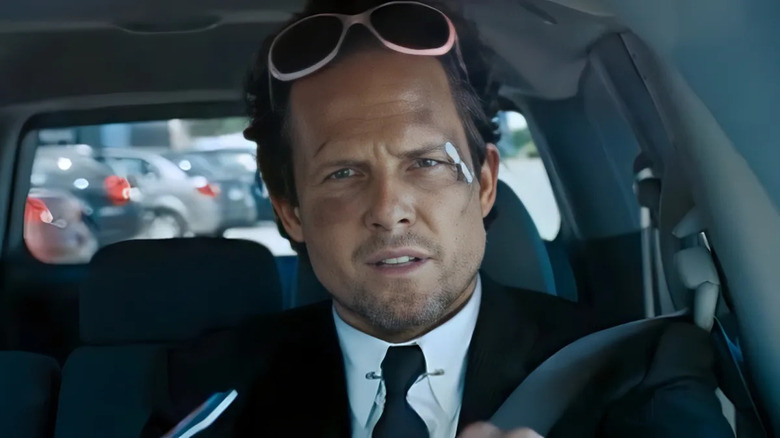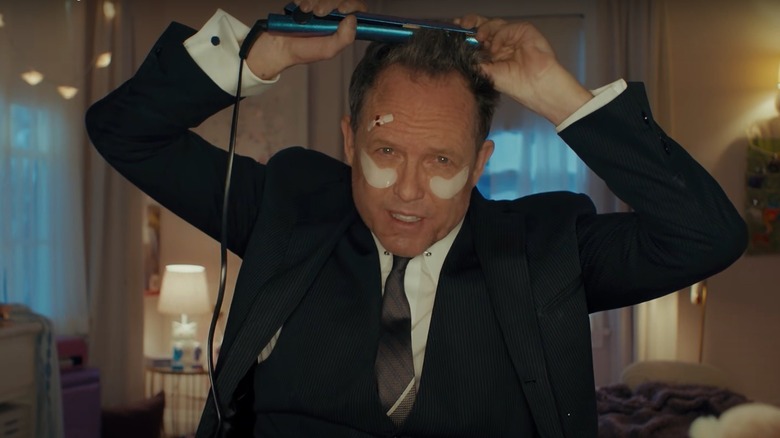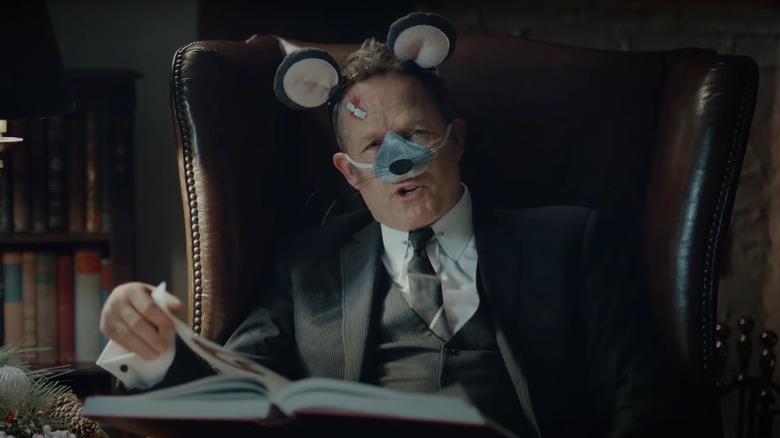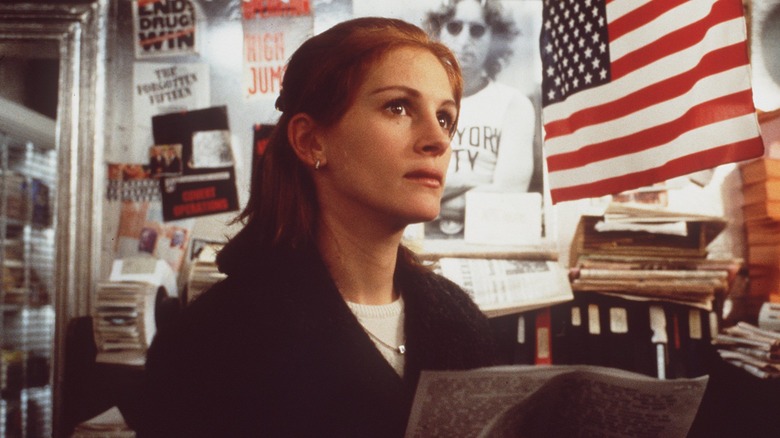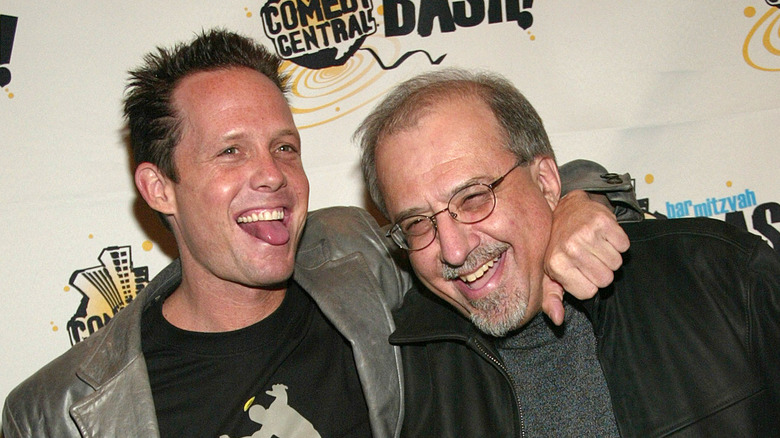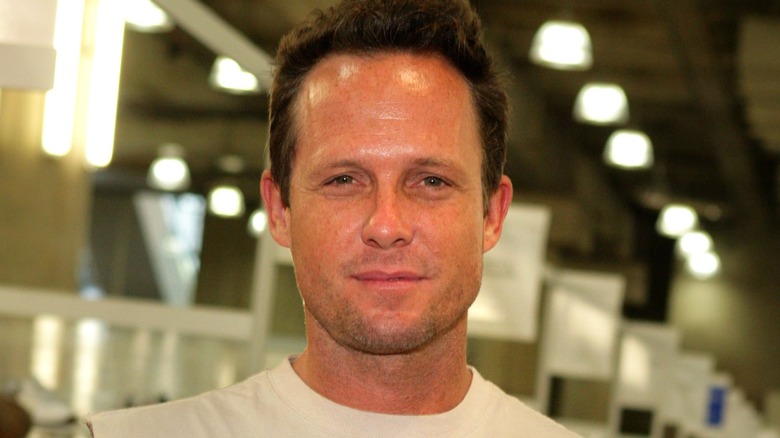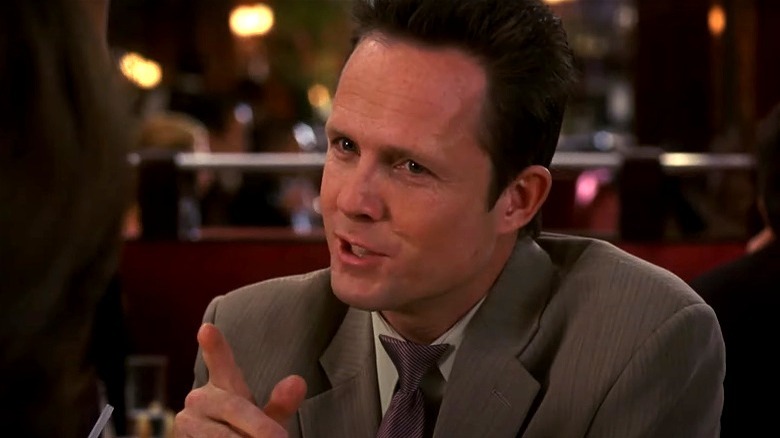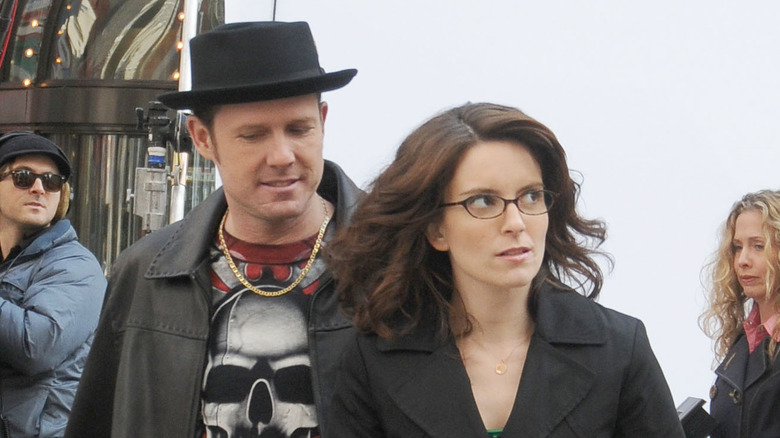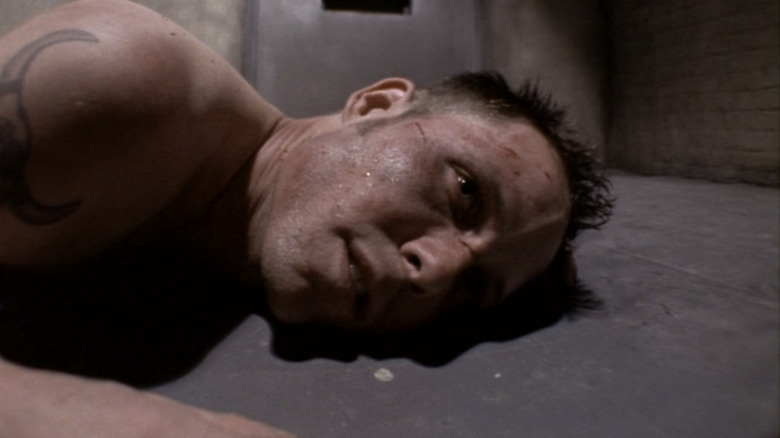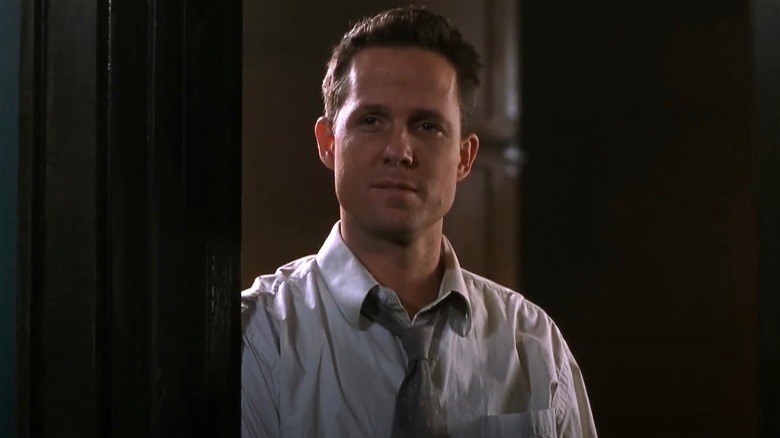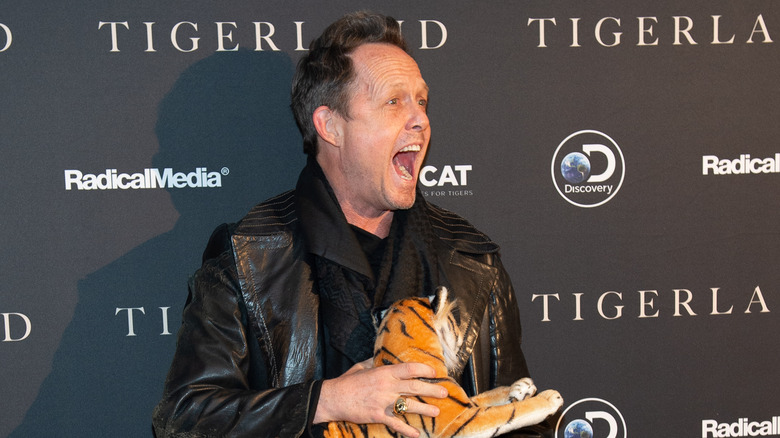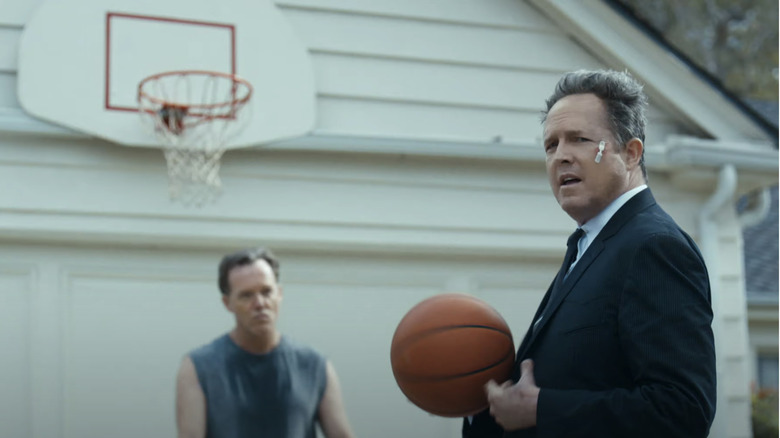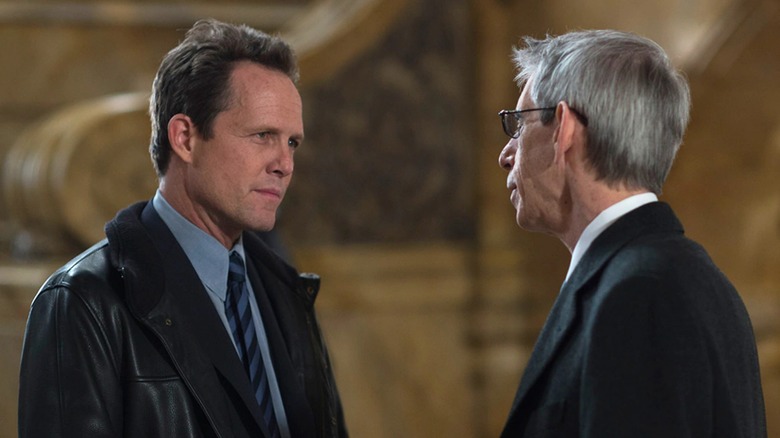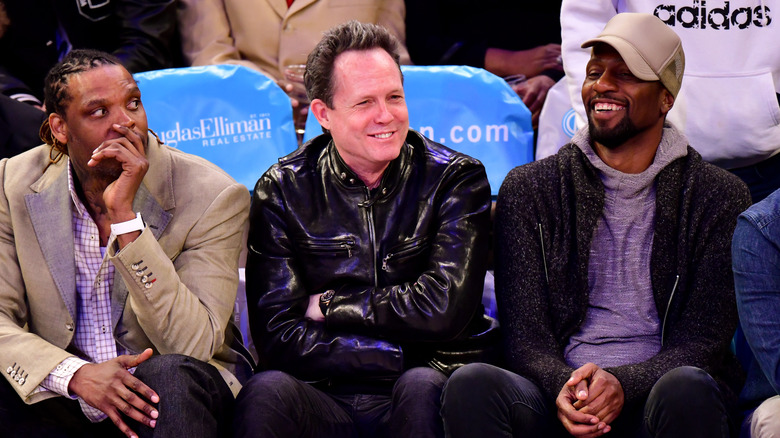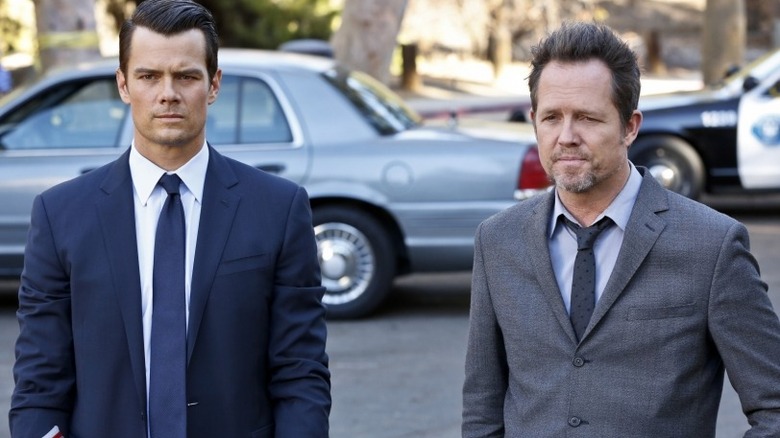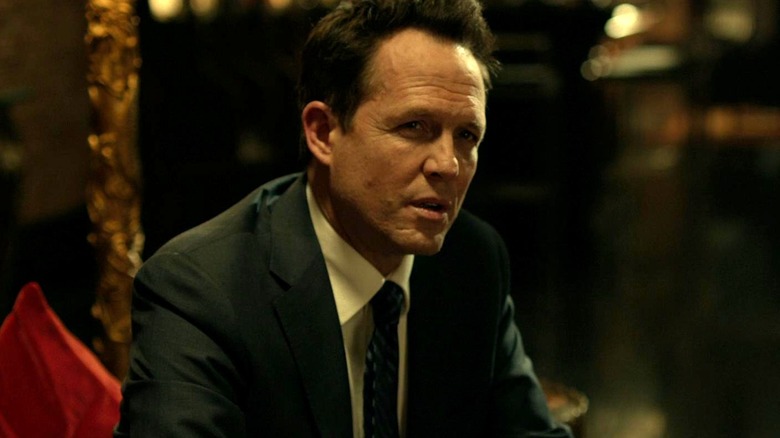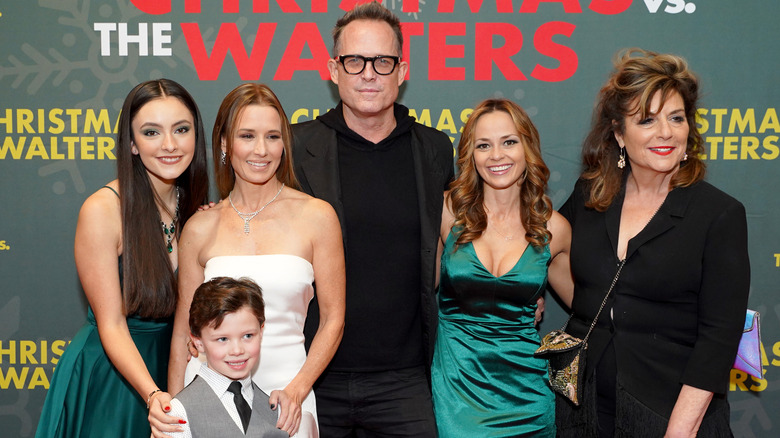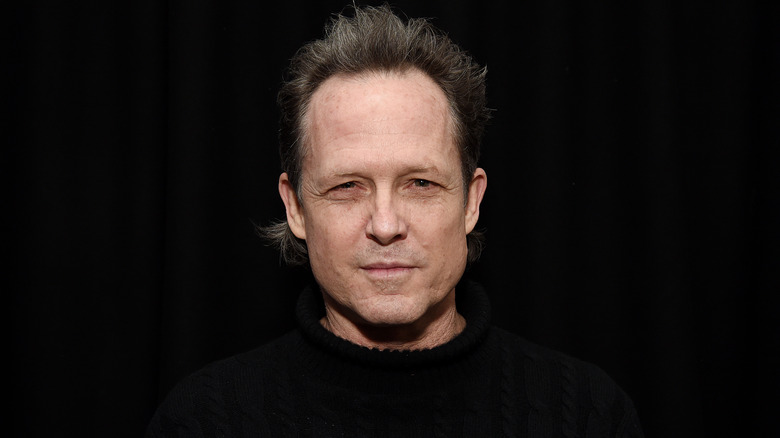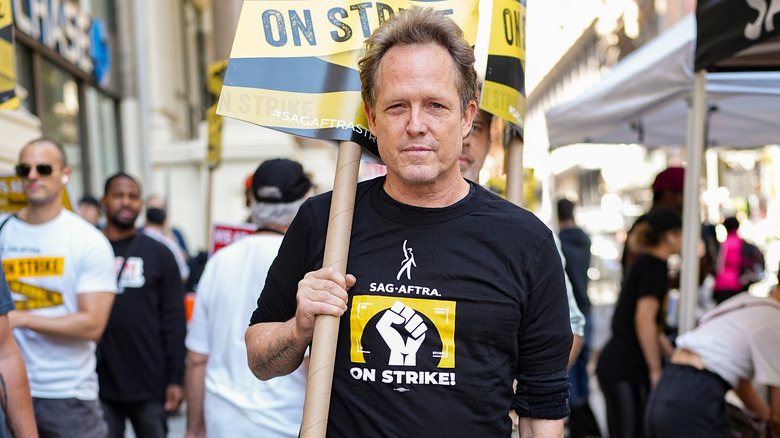What You Didn't Know About The Allstate Mayhem Commercial Guy
We may receive a commission on purchases made from links.
It's rare that insurance ads leave us doubled over with laughter, but Allstate Insurance's series of "Mayhem" commercials has proven to be a consistent exception to that rule over the years. In fact, this collection of commercials ranks among the most successful campaigns of recent times. "Mayhem's relatability and endless quotables caught on quickly after his debut and the character took on a life of his own beyond the brand," one case study found. "After the first two fiscal quarters of the Mayhem campaign, Allstate saw nearly a 5% increase in sales."
It's easy to understand why the Mayhem ads caught on. Combining deadpan humor and big set pieces to illustrate the importance of a dependable insurance company, they take something most people avoid thinking about and turn it into something viewers look forward to seeing between their regularly scheduled programming. If you've watched these spots and felt like the guy playing Mayhem seems familiar, you're right — aside from his steady gig as TV's most violently abused incentive to buy insurance, he's popped up in a number of shows and films over the last couple of decades. Here are some surprising facts you didn't know about Allstate's Mayhem man, Dean Winters.
Winters grew up near the desert
The man who would be Mayhem was born in New York City in 1964. Dean Winters resides in New York today, and much of his career has seen him starring in productions filmed in and around New York, including "Law & Order: Special Victims Unit," "Rescue Me," and "30 Rock." But, despite his close identification with the Big Apple, the five boroughs aren't where Winters spent all of his adolescent years. He has family in Arizona who he would visit often during his childhood, and in the 1970s, his parents decided to make the move permanently. Winters' dad switched jobs and they went out West, but it wasn't exactly a fairytale for the future actor and his brothers.
"Quite frankly, it was a nightmare," Winters told The Arizona Republic in 1999. "It was a cultural blast coming from cement to the desert. I had a tough time adjusting." It didn't help that the school he ended up attending (Brophy College Preparatory Academy in Phoenix) wasn't exactly next door to his new family home in Scottsdale. Winters went on to attend Colorado College, where he studied English. He didn't exactly enjoy the experience. "Mostly, I majored in trying to get the hell out of school," he later admitted. "School and I never seemed to walk hand in hand."
He once threw a script at a rude casting director
Dean Winters came to acting relatively late in life. After knocking around Europe for a few years in his late twenties, his brother Scott, who was already established in the industry, introduced him to New York City acting coach William Esper. Winters took a class with Esper and quickly caught the acting bug, immersing himself in the downtown theater scene of the early 1990s while bartending to pay the bills. In a 2021 interview with Backstage magazine, he recalled the grind of those pre-cell phone, pre-internet years — calling for auditions at the corner pay phone and mailing out copies of his headshot to agencies and theaters around town.
Even in those early struggling days, Winters was serious about his craft, and expected the same from those he worked with. He recalled one nightmare audition for a film that he had spent days preparing for, but did not receive the same level of attention from the film's director. "I was off-book on five pages of lines, doing my best," he said, "and this guy is in the back on his phone." Rather than finish the audition, Winters threw his script at the director. Needless to say, he did not book that particular role. "I have a lot of integrity and I have a lot of loyalty," he added, "but if you're going to treat me like that, it's coming right back to you in the form of a script to the face."
He actually died (but he's feeling much better now)
On a morning in June 2009, Winters woke up with a fever and stayed in bed all day. The next morning, he still felt terrible and noticed he'd turned gray, so he went to his doctor's office. That's where he collapsed. "I was turning black, and my whole head was swelling up," he later told Page Six. An ambulance raced Winters to Lenox Hill Hospital, but on the way, his heart stopped — for two and a half minutes. Paramedics revived him, and he wound up spending three weeks in intensive care to recover from a horrific bacterial infection. Over the next year, he spent a total of 95 days in the hospital and endured 10 operations, including the amputation of two toes and half a thumb — he'd developed gangrene during his ordeal.
Winters was too sick to work for a year. Right before he nearly died, he'd filmed a pilot for an ABC show called "Happy Town," and when it was picked up to series, producers replaced him with Steven Weber of "Wings." "People in Los Angeles think I'm dead!" Winters sort-of joked. However, exactly one year and one day after he almost died, his best-known work hit screens when Allstate launched its "Mr. Mayhem" campaign. "It's gonna take more than a finger and a couple of toes to keep me down," he said.
He tried to avoid Mayhem
Winters almost didn't make those Mayhem ads. First off, after his medical nightmare, he had to re-learn how to walk. "I was feeling sorry for myself — I had lost toes and half a thumb and the tip of my nose fell off — and this nurse took me to the children's burn unit," Winters recalled to the Sioux City Journal. "I saw these eight kids with prosthetic legs playing soccer and I thought, 'That's it.' That's the moment when I turned everything around and decided to learn how to walk again."
Encouragement came from colleagues, and Denis Leary cast him in "Rescue Me." And then Allstate Insurance sought him out to play the Mayhem guy in its huge commercial campaign. At first, Winters turned them down. "When they offered me the commercial, I said no," he told HuffPost. "My smartass remark was that I became an actor so I wouldn't have to put on a suit and sell insurance. And then my agent slapped me around and said, 'Come on, get real.'" In an interview with Esquire, Winters revealed that he actually said no to Allstate three times before his agent changed his mind. He then "met with the director and realized there's something different here," he told the magazine.
Playing Mayhem saved his career
Dean Winters has admitted that his career needed a shot in the arm by the time he was offered the role of Mayhem, but he didn't believe appearing in a commercial campaign was the right move. Of course, he turned out to be wrong: The commercial was a huge hit, and Winters became a recognizable star overnight. "It premiered on June 19, 2010, and I went to visit my mom in Connecticut, so I watched it with her," Winters said during an Esquire interview. "The next day taking the train back into the city, everyone in the train car was looking at me." Soon after that, there was an incident on the subway that introduced Winters to the life of a man with a famous face with a bang.
"I got on the subway and it was the first time I ever felt threatened on the subway," he explained. "This was the next day and all these kids were on the train and they recognized me and started going insane." According to Winters, the attention "hasn't stopped" since then, with people recognizing him out and about in New York on a regular basis. However, the important thing is that he hasn't had a long stretch without work since becoming Mayhem, something he never saw coming. "If someone told me an insurance commercial was going to be the thing [that] resuscitated my career, I would have laughed in your face," he said.
Mayhem made billions for Allstate
The Leo Burnett advertising agency conceived the Mayhem ads, and in 2011, Burnett executive vice president Nina Abnee told Ad Age that one of their inspirations was "to kick Flo's ass." She was speaking about Allstate rival Progressive's extremely popular advertising mascot. Thanks in part to the Flo ads, Allstate's market share dropped for two straight years. Also not helping: The company's previous sober, conservative ads featuring "24" actor Dennis Haysbert calmly and seriously reminding TV viewers of the importance of insurance. Progressive and Geico wooed a younger audience with fun, funny, and memorable commercials emphasizing their product's low cost.
The Mayhem campaign reversed Allstate's fortunes with Winters' character and an emphasis on value over price. (Mayhem frequently belittles "cut-rate" insurance and the people who buy it.) In 2011, 502 Americans were surveyed on 11 insurance company ad campaigns. After the Geico Gecko and Progressive's Flo, Allstate had the most correctly identified ads, thanks to Mayhem. Considering that the Geico and Progressive characters had been seen on TV for years, and Mayhem had only been around for months, that's some remarkably quick-setting brand awareness. By the end of the second fiscal quarter, the Mayhem campaign had made $7.9 billion for Allstate.
He became good friends with Julia Roberts while working on Conspiracy Theory
Winters landed his first movie role in the 1997 Mel Gibson/Julia Roberts thriller "Conspiracy Theory." Up to that point, he had primarily paid the bills with a bartending job, which he held literally up until filming was under way. "My last night of bartending was Thanksgiving '96, and I started filming that movie either the next day or a couple of days later," he told AV Club. He immediately got a taste of how frustrating the movie business can be. "I had a much bigger part, but it got completely whittled away," Winters claimed. "I spent a lot of time on the set twiddling my thumbs, trying to figure out how I was going to quit the business. It was a tough job!"
Winters actually did try to go back to his old bartending job, and he might have, had he not deliberately burned that bridge. "The owner wouldn't take me back because I told him to go f*** himself when I quit," he recalled. "Because I wanted to make sure when I quit that I wouldn't have a way back in!" He asked anyway ... and was denied. Still, even if he couldn't get his old gig back, he had his first film on his resume and he even managed to strike up a relationship with one of the stars. "I would go to Julia Roberts' trailer, and she and I became friends," Winters said. "I used to walk her dogs for her on the set."
A guy walks into a bar...and hires Dean Winters
"Conspiracy Theory" wasn't Winters' first screen acting gig overall. During the 1995–96 TV season, he had a recurring role as Tom Marans on NBC's acclaimed police drama "Homicide: Life on the Street," which he landed through his connection with "Homicide" creator and producer Tom Fontana.
That friendship started when Fontana, during the first season of "Homicide," walked into Winters' Upper East Side bar one night. Fontana offered to write a role into the show for Winters, but he passed; as he recalled to the AV Club, "I told him I wasn't ready to be on TV yet, because I was still living downtown and doing theater." Eventually, he relented. When Fontana moved on to create the searing prison drama "Oz" for HBO, he wrote the role of Ryan O'Reily specifically for Winters.
Winters isn't the only guy in his family with an "Oz" connection. His brother, Scott, is also an actor, and he and Dean played brothers on "Oz." And then there's a third brother, Bradford Winters, who served on the "Oz" writing staff. This critically acclaimed show really was a family affair for the Winters brothers.
Dean Winters was once a malt liquor pitchman
Dean Winters has been in plenty of movies and TV shows, some of which are downright iconic. Yet, he arguably remains best known to millions as Mayhem, the chaos-inducing mascot for Allstate. Insurance isn't the only thing Winters has pitched in his career, though, and decades before he was crashing cars and smashing bars, he was the face of something very different: Colt 45 beer. It's a job he only took because he wasn't finding work on television, but it remains an interesting footnote in his long and winding career. "I've done a few jobs out there for the money and I find those jobs have come back to haunt me," Winters told Esquire in 2011. "I was the only white guy ever cast in a Colt 45 ad."
The actor went on to explain that the makers of Colt 45 were coming under some pressure from the NAACP. The company launched what The New York Times called "aggressive marketing campaigns aimed at minority drinkers" in the 1980s. According to Winters, the backlash against these campaigns is why he was cast. "They had to make a commercial with a white guy, and that was me." The commercial itself has been lost to history, much to the actor's annoyance. "[It] was before the internet, before cell phones," Winters said. "I cannot find this thing."
Only a dummy wouldn't audition for 30 Rock
For viewers of the Tina Fey sitcom "30 Rock," Dean Winters will always be Dennis Duffy, Liz Lemon's arrogant, sleazy, odious, pager-selling, on-again-off-again boyfriend. Duffy's many quirks — including his use of "dummy" as a nickname for Liz — made him a fan favorite, but he almost didn't get the gig.
"I went to the audition for '30 Rock' — I walked in, and there was, like, 30 guys up there reading for my role, and they all — they were the funniest guys in New York City," Winters later told The AV Club. "I'm not going to mention any names, but they were all a bunch of funny guys my age." Faced with that level of talented competition, Winters bolted.
Later on, his agent's assistant called to ask how his audition went. Winters lied and said, "It went good." The assistant called him out. "He said, 'Really? That's interesting. Because they're waiting for you. They said they haven't seen you yet.'" The agency also issued an ultimatum: Go back to the audition, or they'd drop him as a client. Needless to say, Winters went back — and got the gig.
He has a special relationship with Tina Fey
In a way, Dean Winters was right to be intimidated by all the comedic actors lining up to audition for "30 Rock." It's hard to remember now, after projects like "Brooklyn Nine-Nine," "Rough Night," and of course, Allstate's Mayhem, but in the early 2000s Winters was not seen by many as a "comedy guy." His best known roles at the time were "Oz" and "Law & Order: SVU," which had their moments of gallows humor, but were otherwise as grim as it gets. "30 Rock" transformed his career, and in the years since, Winters has fully given credit to that show's creator, Tina Fey. "Tina's in my top two favorite people in Hollywood," he told Backstage in 2021. "She's always been in my corner."
What was originally meant to be a three-episode stint in the first season became a recurring role, as beeper king Dennis Duffy appeared at least once in each of the show's seven seasons. Since "30 Rock" ended in 2013, Winters and Fey have remained in each other's orbit: In 2019 they reunited for a pair of Allstate ads promoting the insurance company's new Drivewise app, and over the years he has made guest appearances on the Fey-produced comedies "Unbreakable Kimmy Schmidt" and "Girls5Eva." "I'll do anything for Tina," he said to Backstage. "Just to be part of a Tina Fey production — she knows the quality is going to be good, the actors are going to be good, everything is going to be good."
He was the first man to go full-frontal on American TV (or so he claims)
"Oz" was a landmark show for HBO, bold and theatrical while also punishingly (no pun intended) real. In many ways it was a precursor to the "Prestige TV" era that began in earnest two years later with "The Sopranos." It explored adult themes and serialization in a way that television never really had before, with levels of explicit language, violence, and nudity that would be shocking even in an R-rated film. Thanks to the prison setting and nearly all-male cast, the show was also a somewhat infamous pioneer in the field of male nudity and sexual violence on the small screen. Its first full-frontal scene came in the fifth episode of Season 1, as Winters' Ryan O'Reilly has a mental breakdown while in solitary confinement.
"I was the first male to be full-frontal [exposed] on American television," Winters proudly noted on a 2014 episode of "The Artie Lange Show." While that statistic isn't entirely true — the 1989 Western miniseries "Lonesome Dove" featured a brief uncovered moment, and in February 1997, NBC broadcast "Schindler's List" in primetime uncensored and ad-free — the spirit of the boast is true. "Oz" was a television game-changer, and its sexual frankness paved the way for the next two-plus decades of adult-oriented storytelling. Many men would bare all on the show, literally and figuratively, but Winters was undoubtedly the first.
He had a horrible horror movie experience
As a young man, Dean Winters wrote himself an acting "bucket list" of all the different kinds of projects he aimed to perform in someday. "I was, like, 'I want to be in a horror film, I want to be in a Western, I want to be in this, I want to be in that,'" he revealed to the AV Club. One item Winters can cross off that list: He's appeared in a horror movie. He played a sleazy businessman mourning his wife and dealing with amnesia in the 2002 direct-to-video release "Hellraiser: Hellseeker."
Sadly, while he got to tick an item off his bucket list, it wasn't exactly a dream come true — Winters didn't have the best time shooting the film. "I took that movie at the last minute, I got to Vancouver, and if there were 120 scenes in the movie, I think I was in 116. And I got sick, like, at the end of the first read-through." Winters wound up being extremely ill for three weeks out of the four-week shoot, which took place in a real psychiatric facility. "I was having nightmares and seeing visions in the hospital," Winters said. "It was just bananas."
There's a Dean Winters imposter pretending to be him
Back in 2008, Dean Winters revealed that, somewhere out in the world, there was a lookalike who had been pretending to be him. And whoever it was, they did it often enough that the real Dean Winters was confronted about it in public. "Four years ago, I met a girl in Bungalow 8. She said, 'Oh, my friend knows you,'" he told Page Six at the time. Winters said that he'd never met the woman or her friend before, and that it wasn't the only time this had happened. "I've had other reports of being places where I wasn't," he said.
The actor went on to reveal that the conman had even been dating as him. "Two weeks ago, this Russian girl came up to me and said, 'Are you Dean Winters? Wait here.' She brings her friend over, and her friend says, 'That's not him.' She'd had a five-month relationship with this impostor thinking it was me." According to Winters, he tried to summon the cops, but the woman didn't want to make it a legal matter and left before police arrived. The actor claimed that the mystery man had been using his name to get handouts, including "getting into parties, getting free drinks, and free meals."
Mayhem's brother
An Allstate commercial from March 2023 features Winters once again as Mayhem, here taking the form of "your highly competitive older brother," whose overly aggressive basketball playing turns a friendly pick-up game in the driveway into a potentially costly repair job. The other brother — the one whose garage gets wrecked — is mostly kept in the background as Mayhem hogs both the ball and the scene, but it didn't take long for fans to recognize the actor playing him as Winters' own brother and former "Oz" and "Homicide" co-star Scott Winters.
The two Winters brothers began their on-screen careers at around the same time in the mid-1990s, and Scott, like his younger brother, has played his share of cops and authority figures on shows like "The Dead Zone," "Dexter," and "City on a Hill." But aside from a recurring role on the Netflix renaissance drama "Borgia," his most recognizable role may be one of his earliest, as the Harvard blowhard who gets shown up by Matt Damon in the 1997 drama "Good Will Hunting."
The scene and its instantly memorable punchline ("How do you like them apples?") was even parodied four years later in Kevin Smith's "Jay and Silent Bob Strike Back," with Damon, co-star and co-writer Ben Affleck, and Winters all reprising their roles. In recent years he has turned his attention to the non-profit foundation Merciful, which he founded alongside wife Jennifer and daughters Faith and Grace.
He's been in and out of the criminal justice system (on TV)
During his time on "Homicide," Dean Winters developed a friendship with co-star Richard Belzer, who portrayed sardonic detective John Munch. That show ended in 1999, right around the time Dick Wolf was casting for "Law & Order: SVU," a spinoff of his show "Law & Order." He wanted Belzer to reprise his role as Munch, and Belzer said he would under the condition that Winters portray his partner in the NYPD sex crimes division.
Wolf complied, and Winters got the role of Det. Brian Cassidy. Unfortunately, due to his commitments to "Oz," Winters had to leave "SVU" after just 13 episodes. (They wrote him out by explaining that Cassidy grew overwhelmed with the sick, sad world of investigating rapes and murders, and he transferred to elsewhere in the NYPD.) After years of feeling like he had unfinished "SVU" business, Winters finally returned for the Season 13 finale in 2012 and subsequently remained part of the recurring cast.
Winters is a massive New York sports fan
Dean Winters is a regular at the hallowed grounds of New York's stadiums and arenas, where his unwavering support for his ancestral city's sports teams is well known. He's a frequent visitor to Madison Square Garden, and Winters has been spotted sitting courtside with celebrity friends at New York Knicks games. He's also been seen attending Rangers hockey games, and on Instagram he talked about how sports was a big part of his childhood.
In the post, he recounted the story of how his father took him to his first hockey game when he was just five years old. His long-standing love for the Rangers made it all the more meaningful when he appeared on the jumbotron as a celebrity fan. "Where it may seem trite to few, to be on the Jumbotron is a humbling New York City moment which I couldn't be more grateful for," he said.
In another memorable moment, his role as Mayhem led to him meeting with legendary New York Yankees play-by-play man John Sterling during an appearance on the Boomer & Carton radio show in New York. Sterling even promised to watch Winters in his critically acclaimed CBS drama "Battle Creek," which no doubt made his day.
He starred in Vince Gilligan's axed Breaking Bad follow-up
Vince Gilligan had the world at his feet after his Emmy juggernaut "Breaking Bad" came to an end in 2013. Spin-off series "Better Call Saul" got underway in 2015, but his "Breaking Bad" producing partner Peter Gould was the showrunner on that, so Gilligan turned his attention to a new project, a cop show called "Battle Creek." The series launched on CBS in 2015, a collaboration between by Gilligan and "House" creator David Shore.
"Battle Creek" stars Josh Duhamel as FBI Agent Milt Chamberlain, whose field office has shipped him out to a small town in Michigan. There he works with Detective Russ Agnew (Dean Winters), a local cop who's eager to get his teeth stuck into a tough case with someone who might have more resources than his beleaguered police department. The pair get more than they bargained for when they take on a murder investigation involving a local drug ring.
Unfortunately, despite stellar reviews from critics, the viewer response was a far cry from Gilligan's previous series: If you've never heard of "Battle Creek," that's because the show was given the axe after just 13 episodes. Part of the issue was that people were always going to compare "Battle Creek" to Gilligan's smash hit. "How do you live up to 'Breaking Bad?' You can't. It's impossible," Winters told Collider. "That could be the best show in the history of television, or the top five, at least. There's really no comparison."
His John Wick audition was terrible
Before playing Mayhem, Dean Winters was a regular on television, appearing in several big shows. However, hit movies had always eluded him. He had a small role in 2007's "P.S. I Love You," but after becoming the face of Allstate Insurance, more movie roles started coming his way. In 2014, he finally appeared in a bonafide movie classic, taking a major role in the Keanu Reeves action-thriller "John Wick" — he plays Avi, one of the movie's main villains. The right-hand man of criminal kingpin Viggo Tarasov (Michael Nyqvist), Avi has a tough guy exterior but he's a coward underneath.
According to Winters, it was his work in "Oz" that got him the role. "I didn't have a good audition, but the directors, Chad Stahelski and David Leitch, were big 'Oz' fans," Winters told Esquire, meaning he all but had the job the moment he walked through the door. As for Avi, the actor says he liked that it was something new for him. "My character in that I feel is the opposite of what I've done in my career, so it was great making this crooked hedge-fund guy a whiny p***y." Avi meets his end at the hands of John Wick himself, which is why Winters hasn't taken part in any of the sequels.
Winters has missed out on a lot of movie roles
Dean Winters hasn't yet made it to leading man level in Hollywood, though it's not through a lack of trying. During his candid 2015 interview with Esquire, the actor opened up about his attempts to climb the Tinseltown ladder, revealing that there are "so many" roles he wanted but didn't manage to land. "I have never been considered for a lead in a studio picture yet, but there were some second and third roles I wanted," Winters told the magazine. "I remember I wanted a small role in 'Michael Clayton' playing George Clooney's brother. Stuff like that. I read for a role in 'Winter's Bone,' it wasn't John Hawkes' role, one of the others."
There's no telling what kind of direction his career may have taken had he landed these roles. Like any actor, Winter would love to lead his own movie, but that's not because he's unsatisfied with smaller roles. In fact, he often finds that these characters are more in his wheelhouse. "A lot of times I vibe to the roles that are a small brush stroke," he explained. "Small but a shot of substance." While he's yet to make a major mark at the movies outside of "John Wick," Winters is hopeful that putting in good work on TV will eventually "open more doors to the movie side," he said.
He starred in one of Hollywood's first COVID-era movies
In 2020, the COVID-19 pandemic shut down movie theaters across the country for months, and when they finally reopened, the industry had sustained damage that would take years to recover from. But the global crisis didn't just impact Hollywood via cinema closures, it essentially ground production to a halt, with the industry shuttered for much of the year. It wasn't until very late in 2020 that any new studio productions went before cameras, and one of the first featured Dean Winters.
Always on the lookout for a movie role, Winters took a part in "Christmas vs. The Walters," an independent holiday movie starring Shawnee Smith ("Saw"), Bruce Dern ("The Hateful Eight"), and Chris Elliott ("Groundhog Day"). When it began filming in November, the pandemic was still raging and vaccines were still weeks away. The production, which took place on Long Island, utilized plenty of safety precautions, including mask-wearing during rehearsal and regular testing for coronavirus among cast and crew.
Making the movie was "challenging," Winters said when he spoke to TV Meg alongside Shawnee Smith. According to Smith, the weather wasn't helping matters. "You can't really rehearse like that," she said. "I mean, you do the best that you can, but all the windows and doors are open for ventilation, and it's November. In November in New York, in Long Island; you're freezing." Despite all the hurdles, the film was completed and got a limited theatrical release the following November.
Fashion is in the blood for Dean Winters
Plenty of celebrities have expensive hobbies. Jay Leno famously collects cars, Nicolas Cage loves vintage comics, and Nicole Kidman is a noted coin collector. It's not cars, comics, or coins that have fascinated Dean Winters, but the world of high fashion. In an Esquire profile of the actor, Winters talked about his love of fashion and style, revealing that it runs in the family. "I grew up in New York and I've always been surrounded by fashion," he said. "My grandmother used to write for Vogue in the '50s, and my mother was a dancer and a model."
However, as much as he's come to love fashion, the shopping part doesn't appeal to him. "It's my least favorite thing about fashion," he explained. "I really love Paul Smith. And Chrome Hearts. They make the most beautiful, high-end leather and outerwear and jewelry you've ever seen. But I'm not a big fan of shopping." The actor counts a set of Wesco boots as his favorite fashion item — a pair he says he's had all his life.
Of course, playing Mayhem also gave him the opportunity to experience some high fashion up close. The actor always looks very smart in the Allstate ads, and he could have looked even flashier — Winters told the magazine that there were "rows of the most beautiful clothes you'd ever seen" at the first fitting. "Everything from 1950s gangster suits to beautiful shoes. It was ridiculous." Regretfully, the expensive Ralph Lauren suit that was chosen for the shoot was completely destroyed for the commercial, much to his dismay.
He has a swanky apartment in New York's celebrity hotspot neighborhood
To say that Dean Winters loves New York City is an understatement. Whether he's out at a sports game or joining the SAG-AFTRA strikes at the Netflix and Warner Bros. Discovery offices in the city, the actor is usually found in the Big Apple. "I never, ever leave New York," he told The Sydney Morning Herald while promoting "Battle Creek," a rare Winters project filmed away from New York. In 2018, Winters made it clear that he still considers New York home: The New York Post confirmed that he had bought a new residence in Manhattan for $3.5 million.
According to the public records cited in the report, Winters purchased a duplex in the Tribeca neighborhood. It's the same area that superstars like Robert De Niro, Jennifer Lopez, and Beyoncé call home, and it even has a so-called "paparazzi-proof" luxury apartment building where the likes of Jake Gyllenhaal, Ryan Reynolds, and Jennifer Lawrence have all lived at one time or another.
As for Winters' Tribeca pad, the two-bedroom, two-level condo has a host of swanky features, including a real wood-burning fireplace and an entertainment area with 12-foot ceilings. "The master bedroom suite features a skylight, a walk-in closet and an ensuite spa-like bathroom with a shower and separate soaking tub," the Post revealed. "A spiral staircase leads to the second level, and showcases a den or home office that opens to the private roof terrace." There's even an entrance that is highlighted for its use as a private art gallery. And, by all accounts, Winters got quite the bargain on the unit, as it was for sale for over $5 million just two years earlier.
